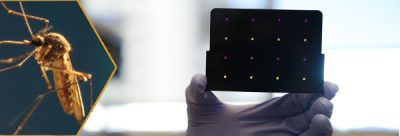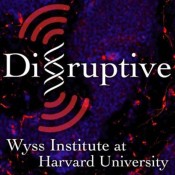Disruptive #10: Sports Genomics
Written on April 23rd, 2017DISRUPTIVE #10: Sports Genomics
McNally:
Hello, I’m Terrence McNally and you’re listening to DISRUPTIVE the podcast from Harvard’s Wyss Institute for Biologically Inspired Engineering.
Can sneaker endorsements, cereals, protein powders or electrolyte cocktails get any of us closer to the peak level performance of our favorite athletes? Despite billions in sales, the answer is probably no. But how about an elite athlete’s biology?
With 100 trillion cells in the human body, bacteria outnumber our own human cells 2 to 1, and bacteria in our gut affect all our key organ functions. They play a role in our health, development and wellness, including endurance, recovery and mental aptitude.
What if we could tap the gut bacteria of elite athletes to produce customized probiotics – and what if those probiotics could give recipients access to some of the biological advantages that make those athletes elite?
A former NBA hopeful in the lab of George Church at the Wyss Institute asked that question a couple of years ago and the lab is now moving toward a startup to bring such products to market.
In related news, consider this: With 2015 sales of $115B, sports-based nutraceuticals made up the largest share of the global nutraceutical market, but probiotic-focused sports products made up less than 1% of those sales.
I’ll talk with Wyss Research Fellow JONATHAN SCHEIMAN and – a previous guest on Disruptive – Wyss core-faculty member GEORGE CHURCH.
Continue reading “Disruptive #10: Sports Genomics”
Disruptive #7: FISSEQ – Fluorescent In Situ Sequencing
Written on October 7th, 2016Until recently, to analyze many mRNAs simultaneously, scientists had to grind cells to a pulp, which left them unable to pinpoint those mRNAs within the cell. Developed by a team at the Wyss and Harvard Medical School, FISSEQ allows scientists to pinpoint thousands of mRNAs and other types of RNAs at once in intact cells, and stands to revolutionize clinical diagnostics and drug discovery.
Listen and subscribe to Disruptive on Soundcloud, iTunes, or Google Play.
Disruptive#6: Rapid, Low-cost, Paper-based Test for Zika
Written on June 24th, 2016McNally:
Hello, I’m Terrence McNally and you’re listening to Disruptive, the podcast from Harvard’s Wyss Institute for biologically inspired engineering. In early May, a low cost, rapid, paper-based diagnostic system for strain specific detection of the Zika virus was introduced by an international consortium of researchers led by synthetic biologist James Collins with the goal that it could soon be used in the field to screen blood, urine or saliva samples.
The core of the test kit is a piece of paper that changes color in the presence of Zika virus RNA and produces results in two to three hours. Much faster and cheaper than the PCR test used now according to Collins, a Wyss core faculty member – and it should cost less than a dollar per test adds University of Toronto biochemist Keith Pardee.
I’m going to speak with both of them about the real time story of a crisis
inciting innovation. How a team from a number of different institutions came together, and in a matter of six weeks developed a new approach to detection and designed a system to deploy in the face of future pandemics. Collins says, in response to an emerging outbreak, a custom tailored diagnostic system could be ready for use within one week’s time. We’ll explore how they did it, what they’ve learned and what this might mean for the future.
The mission of the Wyss Institute is to transform healthcare industry and the environment by emulating the way nature builds. Our bodies and all living systems accomplish tasks far more sophisticated and dynamic than any entity yet designed by humans. By emulating nature’s principles for self organizing and self regulating, Wyss researchers develop innovative engineering solutions for healthcare, energy, architecture, robotics and manufacturing.
In addition to leading the Living Cellular Devices and cellular devices platform at the Wyss, Jim Collins is the Termeer professor of medical engineering and science and professor of biological engineering at MIT. He’s a member of the Harvard MIT health sciences and technology faculty and an institute member of the Broad Instiute of MIT and Harvard.
Collins received a BA in physics from Holy Cross and a PHD in medical engineering from Oxford. A Rhodes Scholar, a MacArthur Fellow and a winner of the National Institutes of Health Directors Pioneer Award. Jim is one of the founders of synthetic biology as well as a pioneering researcher in systems biology and his engineering ranges from the physical scale of wearable medical devices to that of molecules.
Collins says he found early inspiration both in the space program and much closer to home.
Collins: [02:38]
I was born and grew up initially in New York City. My dad was an electrical engineer who had worked in the aviation industry so he did work for NASA, he did work for the military, he did work for a number of companies building planes. My mom was a math teacher.
Continue reading “Disruptive#6: Rapid, Low-cost, Paper-based Test for Zika”
Disruptive: Synthetic Biology Pamela Silver & George Church
Written on February 21st, 2016
I’m excited to offer the first episode of DISRUPTIVE, my new monthly podcast series produced with Harvard’s Wyss Institute for Biologically Inspired Engineering. The mission of the Wyss Institute is to: Transform healthcare, industry, and the environment by emulating the way nature builds, with a focus on technology development and its translation into products and therapies that will have an impact on the world in which we live. Their work is disruptive not only in terms of science but also in how they stretch the usual boundaries of academia.
In this inaugural episode, Wyss core faculty members Pamela Silver and George Church explain how, with today’s technology breakthroughs, modifications to an organism’s genome can be conducted more cheaply, efficiently, and effectively than ever before. Researchers are programming microbes to treat wastewater, generate electricity, manufacture jet fuel, create hemoglobin, and fabricate new drugs. What sounds like science fiction to most of us might be a reality in our lifetimes: the ability to build diagnostic tools that live within our bodies, find ways to eradicate malaria from mosquito lines, or possibly even make genetic improvements in humans that are passed down to future generations. Silver and Church discuss both the high-impact benefits of their work as well as their commitment to the prevention of unintended consequences in this new age of genetic engineering.
DISRUPTIVE: BIO-INSPIRED ROBOTICS features three separate interviews with (1) RADHIKA NAGPAL, (2) ROBERT WOOD, and (3) CONOR WALSH
Written on October 15th, 2015Welcome to the second episode of my new monthly podcast series produced with Harvard’s Wyss Institute for Biologically Inspired Engineering.
DISRUPTIVE: BIO-INSPIRED ROBOTICS features three separate interviews with (1) RADHIKA NAGPAL, (2) ROBERT WOOD, and (3) CONOR WALSH. From insects in your backyard, to creatures in the sea, to what you see in the mirror, engineers and scientists at Wyss are drawing inspiration to design a whole new class of smart robotic devices
In this one, CONOR WALSH discusses how a wearable robotic exosuit or soft robotic glove can assist people with mobility impairments, as well as how the goal to create real-world applications drives his research approach.
In part one, RADHIKA NAGPAL talks about her work Inspired by social insects and multicellular systems, including the TERMES robots for collective construction of 3D structures, and the KILOBOT thousand-robot swarm. She also speaks candidly about the challenges faced by women in the engineering and computer science fields.
In part two, ROBERT WOOD discusses new manufacturing techniques that are enabling popup and soft robots. His team’s ROBO-BEE is the first insect-sized winged robot to demonstrate controlled flight.
The mission of the Wyss Institute is to: Transform healthcare, industry, and the environment by emulating the way nature builds, with a focus on technology development and its translation into products and therapies that will have an impact on the world in which we live. Their work is disruptive not only in terms of science but also in how they stretch the usual boundaries of academia.
http://wyss.harvard.edu/
– See more at:
DISRUPTIVE: BIO-INSPIRED ROBOTICS Radhika Nagpal Interview
DISRUPTIVE: BIO-INSPIRED ROBOTICS Robert Wood Interview
Conor Walsh’s interview transcript
http://aworldthatjustmightwork.com/2015/07/auto-draft-18/




